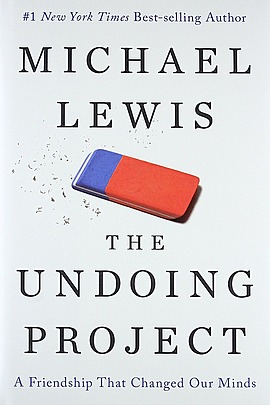
The Undoing Project
The Undoing Project is about a compelling collaboration between two men who have the dimensions of great literary figures. Amos Tversky was a brilliant, self-confident warrior and extrovert, the center of rapt attention in any room; Kahneman, a fugitive from the Nazis in his childhood, was an introvert whose questing self-doubt was the seedbed of his ideas. They became one of the greatest partnerships in the history of science, working together so closely that they couldn’t remember whose brain originated which ideas, or who should claim credit. This story about the workings of the human mind is explored through the personalities of two fascinating individuals so fundamentally different from each other that they seem unlikely friends or colleagues. In the process they may well have changed, for good, mankind’s view of its own mind.
“Lewis has written one hell of a love story.”
— Jennifer Senior, New York Times
“Hugely important.”
— Samantha Power, New York Times Book Review
“A must-read.”
— Greg McKenna, Business Insider
“Fascinating stories about intriguing people.”
— Cass Sunstein and Richard Thaler, The New Yorker
“Brilliant… Lewis has given us a spectacular account of two great men who faced up to uncertainty and the limits of human reason.”
— William Easterly, Wall Street Journal
“Compelling… The Undoing Project is a history of the birth of behavioral economics, but it’s also Lewis’s testament to the power of collaboration.”
— Peter Coy, Bloomberg Businessweek
“Whatever subject strikes his fancy, Lewis renders it clear and understandable while showcasing its human drama. In the realm of exalted journalistic wizardry, he is surely kin to Tracy Kidder and Malcolm Gladwell.”
— Dan Cryer, Boston Globe
“Intellectually mesmerizing and inspiring.”
— Harper's Bazaar
“Mind-blowing… [The Undoing Project] will raise doubts about how you personally perceive reality.”
— Don Oldenburg, USA Today
“Michael Lewis has a genius for finding stories about people who view reality from an unusual angle and telling these stories in a compulsively readable way.”
— Geoffrey Kabat, Forbes

